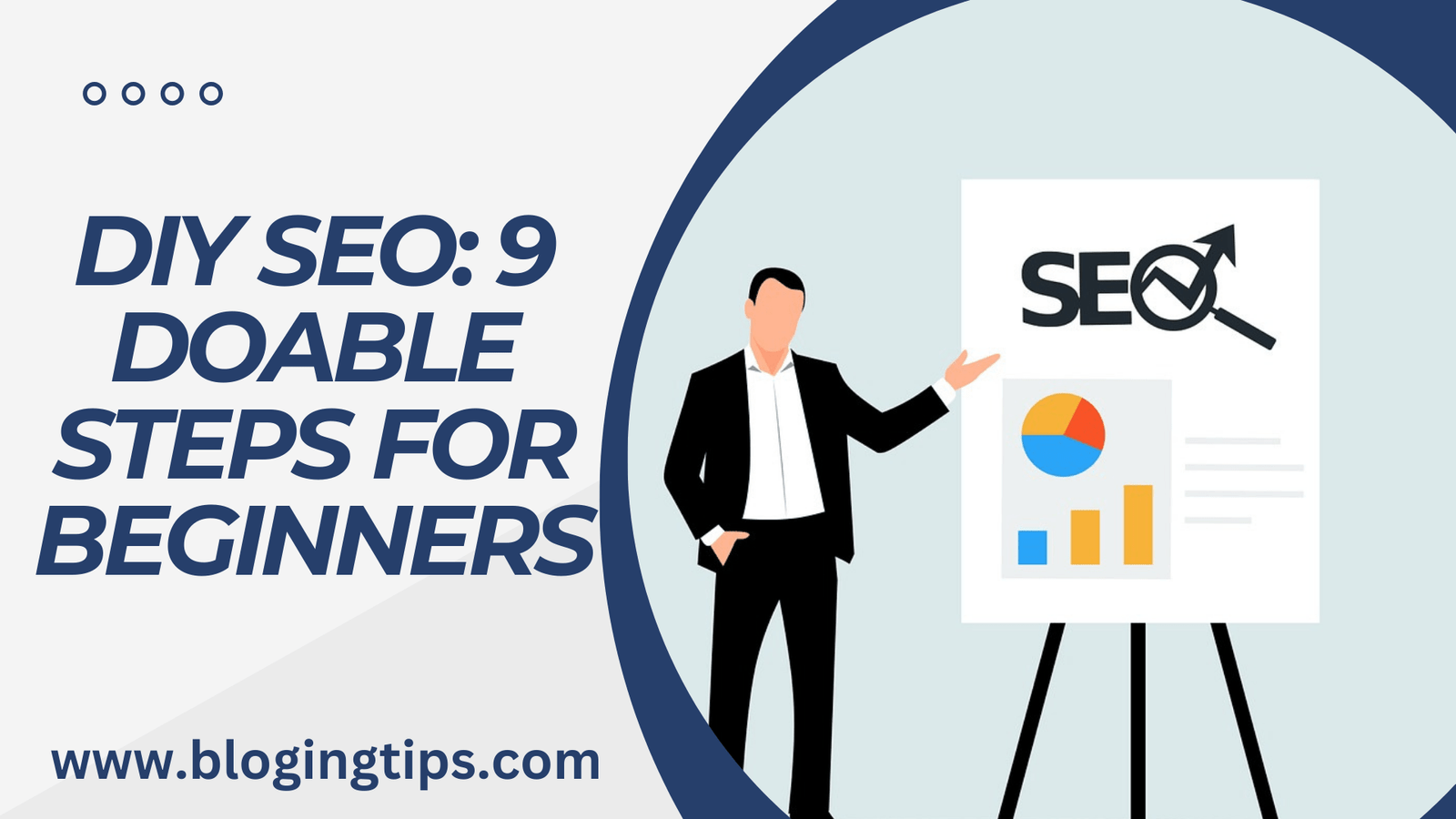A lot of webmasters are willing to make the effort to study and apply SEO by themselves. Yes DIY SEO is feasible.
By gaining an understanding of basics of accurate practices and perfect practices. You can benefit build a website that is designed to be successful in search engines and provides visitors with a pleasant experience.
Although it’s true that at some point during the course of your SEO campaign. You’ll confront issues that might be beyond your expertise or experience, you are able to elevate your site to a certain point and then employ an SEO specialist when the right time comes.
The following article:
- Things to Consider Before You Make a Decision Your Own SEO
- DIY SEO 9 Steps for Beginning Users
- Learn SEO SEO Course
- Meet the Basic technical requirements
- Organize the Structure and Links of Your Website’s Structure and Links The Structure of Your Site and the Links
- Perform Keyword Research
- Create Great Content
- Optimize Meta Tags
- Create optimized images
- Develop Community
- Track Your Progress
- What is it? Employ for an SEO
- Final thoughts regarding the DIY SEO
Questions to Ask Before You Make a DIY SEO

Before embarking into your search, understanding that SEO isn’t always easy is crucial.
Three questions you can be sure to ask prior to starting:
- Have you got patience? First, you need to establish the foundations, which includes some special projects. However, a variety of other tasks will be completed regularly over the lifespan of your site.
- Are you willing to invest in SEO training? Learning SEO from experts is crucial to help you get started in the correct direction. Also, keeping up-to-date on the most recent SEO strategies is a continuous process.
- What are your plans to undertake the technical aspects of your work? The willingness and capability troubleshoot and fix website problems is vital, particularly when it comes to sudden drop in traffic or rankings.
If you are confident that you are able to proceed by implementing DIY SEO You can take the next nine steps to begin.
DIY SEO 9 Steps for Beginning SEO

1. You should take SEO Training
The foundational SEO information before embarking into your search is a must.
You can certainly cobble bits of information in the process. But it’s not as effective as taking the SEO training course right out of beginning.
There are numerous options available, and first. You have decide if an in-person class or a virtual one is the right choice for you.
Classes in person are held at specific times all through the year.
As an example, I have taught myself live SEO instruction in the Southern California classroom, and I also offer it at the most popular conference on search marketing, such as SMX.
Virtual training is another option that lets you learn at your own speed. It doesn’t require travel and can be cost-effective.
For instance For instance, for instance, our SEO training website provides SEO training with live Q&As and multimedia resources, and more.
There are many options available to choose from SEO training. If you’re looking for more details about how to select the best SEO training course, check out my post about Search Engine Land: Five Questions to Assess any SEO Training program.
2. Do the Technical Requirements for Basics meet?
Your website’s performance could affect your ability to rank on your search results. There are some fundamental technical requirements to be aware of, such as
- A mobile-friendly website, that ensures a pleasant user experience for users with tablets and smartphones. The good news is that there are many mobile-friendly WordPress themes perform the bulk of the work.
- Ensure that the website is working for Google. The minimal tech requirements to be listed in results of a search. Payoff includes ensuring that Googlebot isn’t blocked and the websites actually function and have indexable material.You can utilize SEOToolSet’s Site Checker tool to benefit to monitor the health of your site to warrant that your site is meeting technical needs. If you ever encounter a problem with your robots.txt take a look at my beginners’ tutorial on robots.txt.
If you’re interested in getting deeper into the technical aspects of SEO take a look at my blog post on the reasons why technical SEO is essential and the difference in technical SEO as opposed to. On-page SEO.
3. oversee Your Site’s Structure and Links
Site structure is the way in which you organize the material on your site is arranged and interconnected.
A well-organized structure for the site:
- Enhances the user satisfaction. A logical and easy to understand structure allows visitors to find the information they require more effectively. This can boost overall satisfaction with your site and could lead to more visits and greater interaction. Positive user behavior indicates the search engine that your website is worthwhile, and could benefit boost the rankings of your site.
- Enhances indexing, crawling and crawling. Web crawlers are the tools used by search engines to search for and index websites. A well-organized structure allows crawlers to access every page of your site more quickly. The more definitely the search engine is able to crawl your website more efficiently. The greater your chance of getting a good ranking.In its SEO starting guide for ” organizing your site,” Google says that this only applies to big websites. It’s actually not that difficult to bring off an effective structure for smaller websites, so this is a step I would not ignore. For more information, check out SEO Siloing.
- Distributes page authority. A well-planned structure for your website and linking strategy enables the link equity (the ranking power transmitted through hyperlinks) to flow through your site.Google’s PageRank algorithm measures a page’s authority. If a website is deemed to have as having high authority and it connects to another website internally. It transfers some of its authority on to the webpage it links to, which may affect rankings.
4. Conduct Keyword Research

Keyword research helps you discover the terms and phrases prospective customers are with when searching for what you provide on an internet search engine.
The terms used can range from generic (“well-qualified camera”) or particular (“Canon EOS R6 II”) or some even include long-tail (“how to master the fundamentals in photographic basics”).
In actuality, someone may use many different words when they begin the exploration process on the internet, and you have to be aware of them.
Understanding these terms can ensure you’re creating the correct material for your site (and improving it) to be competitive in results of the search outcome the moment your audience enters these terms into Google.
I would not like to sound as if this is an easy task. A good keyword research requires some time, effort and energy. However, for a novice conducting the basics of keyword research can have a significant impact compared to not conducting any keyword research in the first place.
Since SEO is about testing It is possible to discover how your keywords and material strategy is working over time, as you keep track of your improvement. After that, you can improve your strategies.
5. Create Amazing Material
In the end, Google wants to rank websites with excellent material.
Perhaps you’re not as good in other SEO techniques however, if nothing else, you should create excellent material. You’ll stand a better chance of being found in results of a search payoff.
Everything works in concert to create the foundation for excellent material and an excellent user experience. It’s crucial to know the ways in which they interact:
- Identifying the appropriate keywords can benefit you in the creation of your material subjects.
- The creation of useful material assists the visitors (potential customers) in their subject exploration.
- Optimizing your material with keywords naturally assists to improve. Its relevancy to searches so that people are able to locate it.
- An organized website which organizes your material into categories that allow for simple navigation can enhance the user experience and allows visitors as well as search engines to explore additional material (which could affect the rankings of your site and benefit move users further in the journey of a customer).
- “Great material” can be subjective. However, Google has some thoughts about what constitutes good content and I’ve got my own ideas as well.
6. Optimize Meta Tags

Meta tags reside on the web page’s code. Therefore, even though they aren’t visible to anyone who is viewing your website’s page They serve a crucial purpose:
- substance clarify: Meta tags serve crucial information about a page’s material that search engines can use. This is among the primary clues that a search engine has to determine if the site is relevant to the search.
- The first impressions Meta tags provide your site’s first impression on search payoff. The data you add to the meta tags (the pages title, description and page’s URL) could show up as the title and description links in results of the search outcome. (I mention this as a possibility due to the fact that Google is known for its ability to change meta tags, and you can learn more about it here: Do Meta Descriptions Really Matter?). An appropriately designed meta tag may boost the number of clicks through rates.
You should warrant that each page on your site contains distinctive material in meta tags that describe the content about the content.
If you’ve got an WordPress website, SEO plugins can simplify the process of editing meta tags.
(You can learn more about the way the SEO plugin is integrated with the Yoast SEO plugin to assure that your meta tags are adherent in line with perfect guidelines.)
7. Include Optimized Images
Images uploaded on your website can be displayed on Google Search, Google Discover or Google Images outcome. They are a different option for users to locate your site.
For instance, if you seek “tree house designs,” images will be prominent in your results. outcome.
If you are selling any item related to trees and include an image that is optimized of a tree house in your high-quality content and you are a seller, then you may be considered for inclusion.
8. Build Community
If you’ve created a successful website, let people know about it.
Although this isn’t just an SEO issue the advertising and marketing you put on your website in addition to your SEO strategy can have an impact on the rankings of your site.
For example, you can:
- Utilize social media to benefit promote material on your site. (Some of the social media material is listed in Google Search outcome.)
- Collaboration with other brands allows you in co-creating content that puts your site and brand front of a new audience (and possibly driving additional traffic as well as backlinks).
- Participate in the community within your area of expertise like interviewing or being interviewed by an interesting person, which will benefit you receive more attention on your site.
- Make use of pay-per-click ads to benefit sponsor material in order to be displayed on the front page of results of a search outcome.
9. Monitor Your Progression
Every webmaster must sign up for two fundamental (and cost-free) Google tools to track SEO results: Google Analytics and Google Search Console.
Google Analytics
Analytics is a website analytics tool that provides specific information on:
- Traffic to your website Find out the source your visitors come from (geographically and on the internet like direct visits, search engines or from referral websites) and which devices they are using.
- Behavior of visitors Learn about the ways that users interact with your website, such as which websites they browse, the length of time they spend there and the actions they perform.
- Tracking conversions Track conversions of visitors like forms submitted, purchases or any other action to measure the effectiveness of the SEO efforts.
- information efficiency: Discover which pages are most popular and get the most engagement.
Google Search Console
Search Console focuses more specifically on monitoring and sustaining your site’s position on Google Search payoff.
You can also monitor:
- Performance in search: Learn more about the way your website appears in search results and includes information on impressions, clicks and click-through rates (CTR) and the positions.
- Problems in indexing Discover any issues Google faces in indexing or accessing your site along with its material.
- Performance of your site: Understand metrics that help increase your website’s user experience, including important web-related essentials.
You can look over the full set of available features at Search Console Help.
Together, these tools provide complete information about the health of your website, its performance, and areas where SEO could be improved.
How do I hire an SEO
At time, you’ll eventually need to engage an SEO specialist to take your business to the next step.
There are many ways to connect with an SEO agency or consultant whether it’s for a single project consulting, full-service, or SEO.
If you’re looking to hire, I suggest you read the following article I wrote for Search Engine Land:
Last thoughts on DIY SEO
DIY SEO can be done by owners of websites who are willing to study and apply the basic SEO techniques and commit the effort.
SEO isn’t as easy as it appears and could be required in the future skillful benefit. However, starting with this strategy that you can self-guided will boost your chance of being competitive with the other results of the search outcome and also give a positive experience to potential customers.



